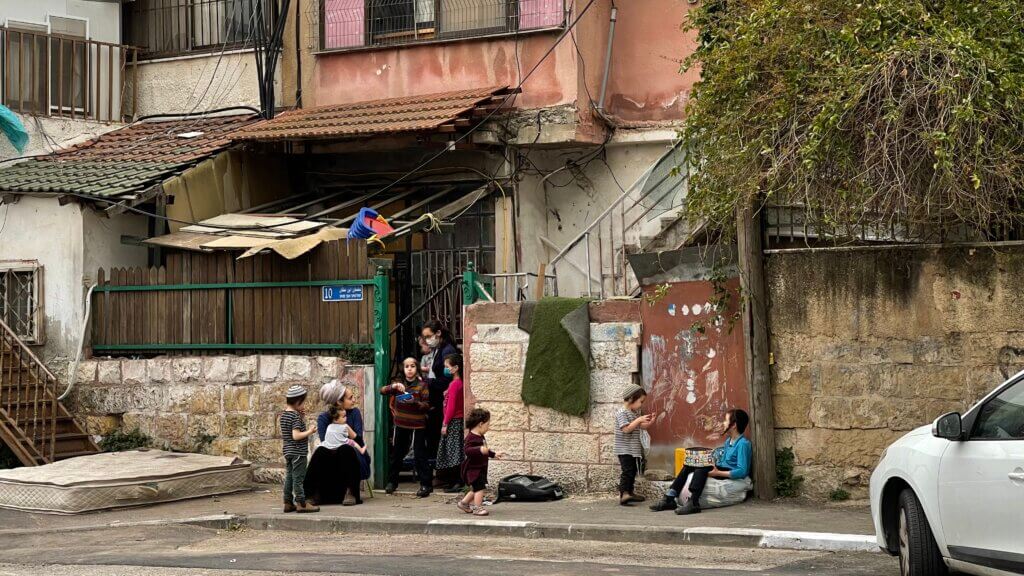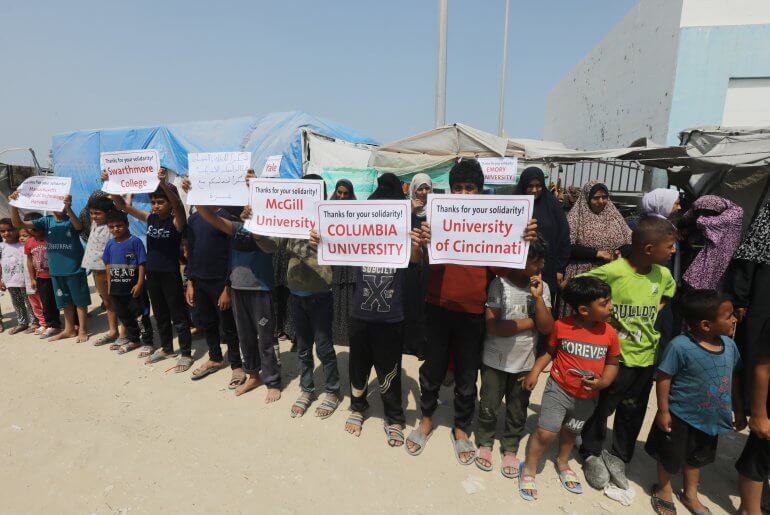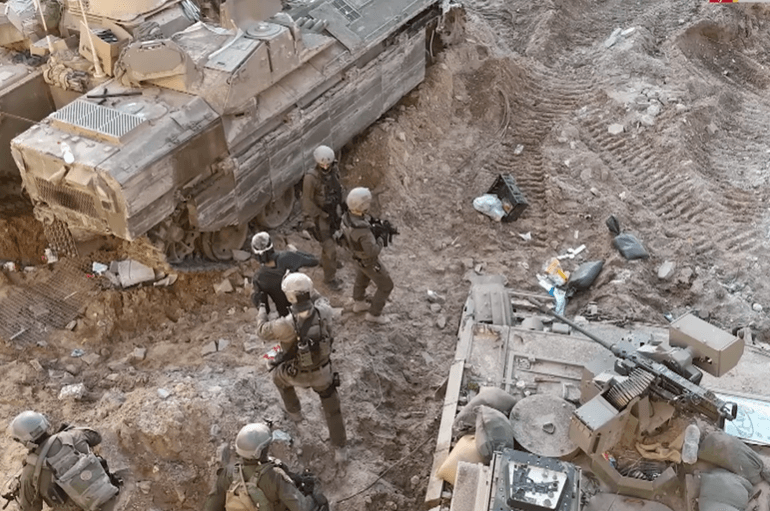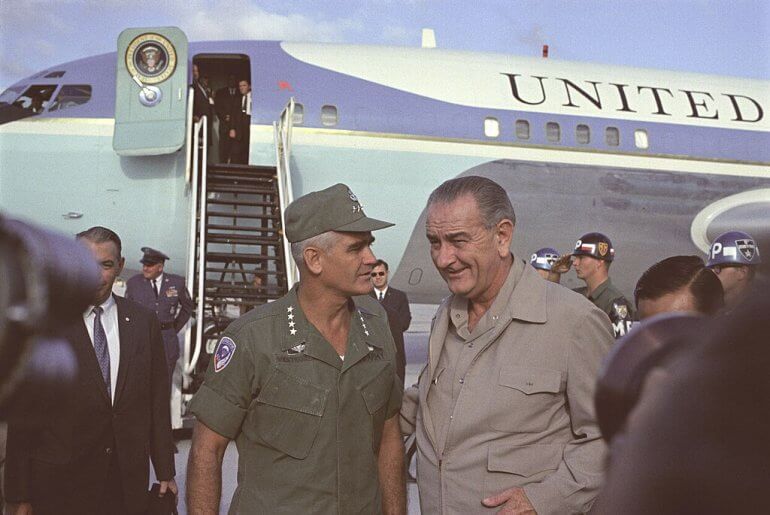In a matter of just two weeks, six Palestinian families, numbering 27 people, will be thrown out of their homes and into the street, and replaced with Israeli settlers.
The fate of the families from the Sheikh Jarrah neighborhood in occupied East Jerusalem is essentially set in stone: an Israeli district court rejected their appeal in February this year, ordering them to vacate their homes by May 2, 2021.
Another appeal filed by seven other families in Sheikh Jarrah, numbering 31 people, eight of them children, was rejected by the same Israeli district court in March, and the families were given until August 1, 2021, to evacuate their homes.
If the families do not leave their homes, where they have lived for the better part of 65 years, they will be forcibly removed by armed Israeli authorities, just like their neighbors before them.
The only hope left for the el-Kurd, al-Qasim, Skafi, and al-Ja’ouni families to save their home from being taken over by Israeli settlers in the next two weeks, is an appeal to the Israeli Supreme Court — a court that has a long history of upholding Israeli settler colonial projects in places like Jerusalem, over the rights of the city’s Palestinian residents.
Over the years, dozens of the families’ relatives, friends, and neighbors have been evicted and replaced with Israeli settlers, as per Israeli court orders.
In 2002, 43 Palestinians from the neighborhood were forcibly evicted after losing a legal battle to the Israeli settlers; in 2008, videos of the al-Kurd family having half their home being taken over by a group of settlers made international headlines; in 2009, the Hanoun and Ghawi families were kicked out of their homes; and in 2017, the Shamasneh family faced a similar fate, as the eight family members, including 75-year-old Fahamiya Shamasneh and her 84-year-old husband Ayoub were removed from their home.

The looming deadline for the May 2 eviction is one that’s weighing heavy on 22-year-old writer and poet Mohammed el-Kurd, who was just 11 years old when his family had their belongings thrown into the street, and half of his home was taken over by a group of Israeli settlers.

“I remember all the Israeli police forces that were there that day, shooting sound bombs and beating up people that were trying to resist them,” el-Kurd, who’s currently based in New York City, told Mondoweiss. “They had completely shut off the neighborhood to the rest of the city, no one was allowed in or out.”
El-Kurd says he still has vivid memories of scenes of Palestinians being arrested in the dozens, as Israeli settlers threw his family’s furniture into the street, and moved themselves into a section of his home.
“I remember, they threw out the stuff that they didn’t want, and whatever they wanted of our belongings, they just kept it,” he said. One of the pieces of furniture that the settlers kept was el-Kurd’s baby sister’s crib, which he says the settler made a bonfire out of in the front yard the next day.
To this day, all that separates the Israeli settlers from the el-Kurd family is drywall, and a clothesline hanging in the courtyard. In just two weeks, however, what little of their home they have managed to hold on to, could be snatched from them once again.
“I was speaking to my neighbors recently, and I told them that I know this has happened to us before, but it’s still so shocking that on May 2nd, people are going to snatch us out of our homes again and throw us in the street. And there’s nothing we can do to stop them.”
‘The Nakba never ended’
The story of Sheikh Jarrah and its residents dates back to 1948, when the state of Israel was established and as a result, the Nakba, or ‘catastrophe’ in Arabic, of the Palestinian people came about.
More than 750,000 Palestinians were estimated to have been forced from their homes and were made into refugees. While tens of thousands of Palestinians fled to the surrounding countries of Syria and Jordan, thousands of others spent years fleeing between towns and cities inside historic Palestine.
Following the Nakba, Israel enacted the Absentees’ Property Law of 1950, regulating the property of Palestinians who, as a result of the Nakba, were abroad, forced to flee, or exiled.
The law defined Palestinian refugees and other displaced persons, including those who only fled to locations a few kilometers away from their original homes, as “absentees,” therefor assigning their properties for appropriation of the state.
In addition to paving the way for the expropriation of thousands of acres of Palestinian land to “state land”, which was then turned over to Jewish communities in Israel, the law also denies the right of said “absentees” the right to return and stake claim to their homes and their land.
A number of refugees from coastal towns like Haifa and Yaffa eventually settled in Jerusalem, where they sought refuge in the Palestinians communities that remained in the wake of the Nakba.
One of those refugees was Rifqa el-Kurd, the grandmother of Mohammed el-Kurd. In 1956, her young family was one of 28 Palestinian refugee families who were offered a home in the Karm Al-Ja’ouni area of Sheikh Jarrah, as part of an agreement between Jordanian government and UNRWA, the UN agency established for the protection of Palestinian refugees.
The new housing project was established on land previously leased by two small Jewish communities, who fled the majority Palestinian area during the Nakba.
As part of the resettlement project, the agreement between Jordan and UNRWA stipulated that the 28 families would receive legal title to the properties within three years, which never happened.
Fast forward to 1967, when Israel seized control of the West Bank, Gaza, and East Jerusalem, occupying and unilaterally annexing the latter, in violation of international law. As a result of the annexation of East Jerusalem, Israel unilaterally applied its domestic law to the territory, including the 1950 Absentee Property law, resulting in the further confiscation of Palestinian property by the state.
In 1970, Israel enacted the Legal and Administrative Matters Law, which exclusively allows Israeli Jews to pursue claims to land and property ownership allegedly owned by Jews in East Jerusalem before the establishment of the State of Israel in 1948.
As per the law, the properties of Jews that were managed by the Jordanian Custodian of Enemy Property until 1967 in East Jerusalem were transferred to the power of the Israeli Custodian General, who can then release such properties to Israeli Jews who claim ownership over the properties, or claim that they inherited the properties prior to 1948, even if those properties are presently inhabited by Palestinian residents — like those in the Karm Al-Ja’ouni area of Sheikh Jarrah.

Following the 1970 law, two Jewish committees claimed ownership over the land in Karm Al-Ja’ouni, alleging that the lands were owned by Jews since the period of Ottoman control in Palestine. After legal proceedings, the Israeli Custodian General transferred ownership of the area to the Jewish committees, and registered the land in their names.
Those Jewish committees then filed a lawsuit against 23 Palestinian families in Karm Al-Ja’ouni. In the midst of the legal battle, during which time the Palestinians in Sheikh Jarrah were being represented by Israeli attorney Toussia-Cohen, the latter reached an agreement with the two Jewish Committees, recognizing their ownership claims, and agreeing that the families would stay in the the properties as “protected tenants”
That agreement was later found to have been made without the knowledge or consent of the Palestinian families who Toussia-Cohen was representing, and eventually paved way for the eviction lawsuit against 28 families in the neighborhood, including those who were not even part of the agreement.
In 1990, the Jewish committees sold their ownership rights to Nahalat Shimon International, a right-wing settler organization whose mission seeks to replace as many Palestinians in East Jerusalem as it can with Israeli settlers and Jewish only neighborhoods.
Since then, Nahalat Shimon International has vigorously fought for the eviction of Sheikh Jarrah’s Palestinian residents, and the subsequent replacement of them with groups of Israeli settlers.
Until now, the group has been successful in every one of their endeavors in the neighborhood, and with the backing of the Israeli district court and full support of the Israeli authorities, have displaced more than 67 Palestinians from Sheikh Jarrah, and continue to seek the imminent displacement of around 87 more.
#SaveSheikhJarrah
As yet another deadline for their forced eviction looms, the remaining Palestinian residents in Sheikh Jarrah are doing everything they can to bring international attention to their case, and ideally international pressure on Israel along with it, with the campaign to #SaveSheikhJarrah.
The hashtag has flooded Palestinian social media for weeks now, as activists in the neighborhood call on international leaders and advocates to pressure Israel to end what they say is an “ongoing Nakba” in Sheikh Jarrah.
Daily advocacy tours of the neighborhood, conducted by its local Palestinian residents, and weekly sit ins and demonstrations have brought increased attention to the situation in Sheikh Jarrah in recent weeks.
Last week, one demonstration made headlines after Israeli authorities violently suppressed the peaceful protest, resulting in the injury of several demonstrators, including Israeli parliament member Ofer Cassif, a Jewish member of the Palestinian-majority Joint List.
There needs to be real action. These settler organizations need to be stopped now. Even if we can’t get them to return all the land they have stolen from us already, we need to stop them before they take more. There’s nothing left for us.
Mohammed el-Kurd
El-Kurd, who has used his platform for years to advocate for his family and neighbors in Sheikh Jarrah, told Mondoweiss that himself and the other activists in the community are making a conscious effort this time around to take control over their stories, after years of being misrepresented by the international media.
“Ten years ago, we didn’t have many English speakers in Sheikh Jarrah, or a coordinated way to approach the media in the neighborhood,” el-Kurd said, adding that as one of the only English speakers, he, an 11-year-old child, was often the default person who was approached by journalists and interviewed for international news.
“I was a child,” he said. “It was incredibly dehumanizing. At that time, the narrative was not ours.”
This time around, el-Kurd says the residents of Sheikh Jarrah are being more intentional in the way they are representing their own story, appealing to international leaders and politicians to “impose real political pressure and real political action against the Israeli occupation for its crimes in Sheikh Jarrah.”
In February of this year, el-Kurd successfully lobbied 81 UK lawmakers in the House of Commons, including Jeremy Corbyn, to sign on to an urgent letter regarding the situation in Sheikh Jarrah.
In the letter, the signatories urged the UK foreign secretary to engage in measures such as banning trade in Israeli settlement products, “to ensure that the UK does everything in its power to ensure it does not assist in such serious breaches of international law.”
In March, a group of 14 Palestinian and regional human rights organizations sent an urgent appeal to the UN Special Procedures on forced evictions in East Jerusalem, particularly the situation in Sheikh Jarrah, highlighting how Israel has unlawfully applied Israeli domestic law to occupied East Jerusalem, resulting in court decisions that almost always favor Israeli settler organizations.
And while Sheikh Jarrah has undoubtedly received a bout of renewed attention in the wake of the upcoming eviction deadline, el-Kurd said that he can’t help feeling defeated by the fact that such appeals often fall on deaf ears.
“I don’t blame the Palestinian organizations who are working to appeal to international bodies and agencies,” he said, adding that “these kinds of appeals need to happen.”
“What I am mad about is that agencies and politicians who continue to turn a blind eye and fail to take action, even after they come to our neighborhood, sit with our families, and tweet about us,” he said, referring to foreign diplomats who frequently visit Sheikh Jarrah, offering platitudes to the residents, but no real action when it comes to holding Israel accountable for its discriminatory policies.
El-Kurd says that through his advocacy, the biggest message he has tried to convey is that what is happening in Sheikh Jarrah can only be combated at a high political and diplomatic level.
“I’m tired of empty letters of condemnation to Israeli officials, without any real action,” he said. “In order to really save Sheikh Jarrah people need to take firm political stances, and apply sanctions to Israel over what it is doing.”
“We haven’t seen enough,” el-Kurd continued. “There needs to be real action. These settler organizations need to be stopped now. Even if we can’t get them to return all the land they have stolen from us already, we need to stop them before they take more. There’s nothing left for us.”
‘It’s not apartheid, it’s ethnic cleansing’
The decades long battle in Sheikh Jarrah has been described by its residents and Palestinian human rights organizations as a clear cut example of Israeli apartheid.
Millions of Palestinian refugees and their descendants, including those living in the Karm Al-Ja’ouni area of Shiekh Jarrah, have no right under the 1950 Absentee property law to claim their original homes and properties from which they were expelled in 1948.
Meanwhile, under the 1970 Legal and Administrative Matters Law, Israeli Jews and settler organizations have the exclusive right to claim property and land that was once said to have been owned by Jews, through often dubious means and with the use of documents whose validity have repeatedly been called into question.
The same Jewish committees and that are now seeking the expulsion of the Palestinian in Sheikh Jarrah, were compensated by the state for the loss of their properties by the Israeli government. The Palestinian refugees living in Sheikh Jarrah were never compensated for the loss of their properties in places like Haifa and Yaffa, nor were the millions of other Palestinian refugees who continue to languish in exile and refugee camps all over the region.
In their appeal to the UN Special Procedures last month, Palestinian human rights groups said that Israeli settlement activities in Sheikh Jarrah “are part of a much larger scheme aimed at forcing the transformation of Jerusalem’s demographic composition and cultural character to entrench exclusive Israeli-Jewish ownership over Jerusalem at the expense of its Palestinian protected population.”
“Not only has Israel unlawfully extended its domestic civil legal system to occupied East Jerusalem, but proceeded to enact more discriminatory laws and policies that enforce the confiscation of Palestinian property in East Jerusalem in favour of settlers, the forcible transfer of Palestinians, and the expansion of Israeli-Jewish presence in the city. Israel’s discriminatory legal foundation provides the basis for its creation of an apartheid regime over the Palestinian people as a whole,” the appeal said.

Mohammed el-Kurd told Mondoweiss that a mistake he believes is often made by international media and audiences when reporting and reading about Sheikh Jarrah, is accepting the legitimacy of the Israeli judicial system over Palestinian communities in occupied East Jerusalem.
“Under international law, the Israeli judicial system has no legal authority over us in occupied East Jerusalem, yet here we are,” he said, echoing the statements of countless human rights groups.
“We are fighting against the settlers, but we are dealing with a settler-colonial court, judge and jury,” el-Kurd said.
“What people in the international community fail to see, is that the headlines saying we are getting ‘evicted’ implies the presence of a landlord with legal authority,” he continued. “But what is happening is that as a collective neighborhood, we are losing our homes by forced displacement and dispossession by the settler organizations that are working in collusion with the state.”
El-Kurd said that he doesn’t believe the word ‘apartheid’ is enough to describe what is happening in Sheikh Jarrah, saying that the term “ethnic cleansing” better encapsulates the reality of what’s happening in the neighborhood.
El-Kurd said that he doesn’t believe the word ‘apartheid’ is enough to describe what is happening in Sheikh Jarrah, saying that the term “ethnic cleansing” better encapsulates the reality of what’s happening in the neighborhood.
“It is a Nakba,” he said, “one that continues to happen to other neighborhoods and communities the same way it did in 1948. We are seeing our neighborhoods being wiped out in front of our eyes.
El-Kurd said that one of his biggest fears is that in 10 years, when walking through his neighborhood, he will find no remnants of the place he grew up.
“If these settler organizations are successful, we are going to pass through the neighborhood and see only settlements,” he said. “There are going to be people writing about Sheikh Jarrah as a distant memory.”
As for the May 2 deadline, el-Kurd says that he’s booked a one-way ticket back to Palestine, and hopes to be able to be there to help his family in what is sure to be a difficult time.
“I hope that we are not thrown out in the street, but if we are, I want to be there to help my parents,” he said, adding that he is “heartbroken about my home, my memories, my life, and my dreams. This is the place where I want to live and die, and it is being robbed from us.”
“I want the world to know that no matter what, we are one hundred percent going to sit firmly in our convictions, and the historical truth that this is our land. We are not going to leave unless forcefully dragged out of our homes.”




Judaism is a respected religion. Zionism, however, is a union of facism and racism!!
Tens of thousands attend funeral for anti-Zionist Rabbi (israelpalestinenews.org)
Israel-Palestine News, April 15/21
“Tens of thousands attend funeral for anti-Zionist Rabbi”Reposted from Naturei Karta, April 9, 2021
“The Jewish people suffered a great loss on March 7, 2021 with the passing of Rabbi Yechezkel Roth, one of the greatest religious Jewish law experts of our generation. He passed away at the age of 86.
“Born in Romania in 1935, Rabbi Roth survived the Holocaust and continued living in Romania until 1953, when he moved to Jerusalem. In 1972 he moved to Brooklyn, New York, where he served as Dayan (Jewish religious judge) in several communities and was an internationally recognized halachic authority, answering the most difficult questions and training younger rabbis. At the end of his life, he split his time between his synagogue, the Karlsburg Congregation in New York, and a synagogue which he established in the town Meiron, in the Holy Land.
“His funeral in Brooklyn was attended by tens of thousands of Jews who came to pay their last respects to this Torah giant. He was transported for burial in Meiron, in the Holy Land, where another large funeral was held. He was buried.
“Four years prior to his passing, on June 11, 2017, Rabbi Roth attended an anti-Zionist gathering of 20,000 Jews in the Barclay’s Center in Brooklyn, where he addressed the masses with the following speech.” https://www.facebook.com/watch/?v=523195142021213
Editor’s note: Naturei Karta is an Orthodox Jewish group that opposes Zionism and the state of Israel. Political Zionism was originally opposed by most observant Jews around the world.
Someone asked “what should we replace BirthRight with?” ( https://mondoweiss.mystagingwebsite.com/2021/04/birthright-doc-should-be-required-viewing-for-jews-who-question-connection-to-zionism/ ). Replace Birthright with a tour of Sheikh Jarrah, an excursion in Gaza, and a few weekends going to the West Bank with Taayush ( https://www.taayush.org/ ) – that way young Jews can really see all sides of Jewish Identity.
“Palestine is not a Quagmire”
Steve Salaita, he includes some pointed criticism of AOC
“The metaphors that attempt to render Palestine complicated obscure the simple brutality of Zionist colonization.
Palestine is not a minefield. Palestine is not complicated. Palestine is not a morass. Palestine is not tricky. Palestine is not a quagmire.
Palestine is not almost impossible to navigate.
Israel systematically abuses millions of Palestinians simply because they’re not what the state defines as Jewish. Israel came into existence through a massive program of ethnic cleansing that continues into the present. Israel prevents millions of Palestinians from returning to their ancestral cities and villages. Israel doesn’t allow those who remain the right of free movement. Israel is central to an ongoing project of Western imperialism. Appraise Israel’s position in the world and you’ll always find it aligned with forces of plunder and accumulation. Israel is a fundamentally racist entity—an ethnosupremacist settler colony, if you prefer—ruthlessly devoted to conquest and domination.
The notion of Palestine as doggedly complicated is a spectacular deceit.”
https://stevesalaita.com/palestine-is-not-a-quagmire/
Zionism is equal to racism and theft.
Viva Palestine and its music!!
Jawaher Ibrahim – Palestine Song [Official Video] – YouTube
“Jawaher Ibrahim – Palestine Song [Official Video]” March 24/21
Alqanunjieh from Gaza performing “parfum de gitane” for Anouar Brahem – YouTube
MUSIC VIDEO: The Edward Said National Conservatory of Music“Alqanunjieh from Gaza performing ‘parfum de gitane’ for Anouar Brahem”
“Become a PATRON to help us make more songs for our occupied homeland Palestine: https://www.patreon.com/FalastinVoices Singer: Jawaher Ibrahim (Palestinian – Gaza) Director: Abdalrahim Alfarra (Palestinian – Gaza) Songwriter: Basman Elderawi (Palestinian – Gaza) Music Arranger: Fahmy Alsaqqa (Palestinian – Gaza) Videographer: Suliman Alfarra (Palestinian – Gaza) Producer: Mahmoud Ghanem (Palestinian – Gaza) Logistics Coordinator: Ahmed Shameya (Palestinian – Gaza) Sponsor: Noura Elwan (Palestinian – Gaza) #PalestineSong“